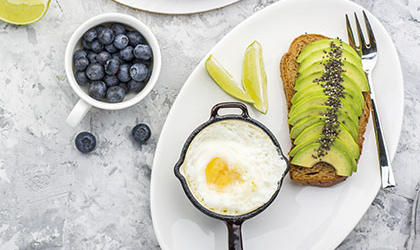
There are many things to navigate during pregnancy and postpartum – physical and emotional changes, looking after your mental health, exercising correctly, and, perhaps most importantly, eating well. Fine-tuning your nutrition is particularly vital for your health and your growing baby. Of all the nutrients, choline is one to watch, as we take a look below.
What is choline?
It might surprise you to learn choline was only discovered in 1998. Neither a vitamin nor mineral – but classed as a vitamin B8 due to its similarities to the B vitamin family – choline is vital for brain development, muscle function, liver health, nervous system function, and cell production.
Why is choline essential during pregnancy?
Aside from supporting health and wellbeing in the general population, choline plays a critical role during pregnancy. In fact, your choline requirements increase by 20 per cent when carrying a baby.
During pregnancy, choline is transferred from you to your growing baby, primarily accumulating in the brain. Crucially, it’s involved in acetylcholine production, a neurotransmitter essential for memory, learning, and muscle control.
Choline also contributes to cell membrane formation and supports neural tube development, which eventually becomes the brain and spinal cord (1).
Research suggests choline supplementation during pregnancy may have long-lasting effects on infant cognition. Studies have shown that higher maternal choline intake is associated with improved attention, memory, and information-processing speed in children (2).
It may also reduce the risk of neural tube defects – like folic acid – and protect against certain neurodevelopmental disorders (3).
Why is choline important when breastfeeding?
Choline is equally valuable during the fourth trimester when choline is passed on via breast milk. Breast milk is naturally rich in choline, but the amount can vary depending on your dietary intake. Therefore, adequate choline levels in breast milk are crucial for your baby's continued brain development and overall growth (5). You need around 30 per cent more choline when breastfeeding.
How much choline do pregnant and breastfeeding women need?
The recommended daily allowance of choline for pregnant and breastfeeding women is higher than for other adults. EFSA (European Food Standards Agency) suggests an intake of 480mg per day during pregnancy and 520mg per day while breastfeeding (4).
Where can you find choline?
Animal foods like red meat, liver, milk and eggs are the best sources of choline. However, you can also find small amounts in plants, including potatoes, legumes, beans, sunflower seeds, and cruciferous vegetables (cabbage, Brussels sprouts, broccoli, and cauliflower).
However, even if you eat a healthy, balanced pregnancy diet, chances are, you’re still not getting enough choline to support you and your baby. Those on plant-based diets or with dietary restrictions may find it even harder to obtain adequate amounts.
Should you take a choline supplement during pregnancy?
Taking a high-strength, comprehensive prenatal multivitamin with good choline is a convenient way to increase your intake during pregnancy. A quality pregnancy multivitamin should also provide other important pregnancy nutrients, including folic acid , vitamin D3 , iron , iodine, and calcium.
Find out more
If you found this article on choline and pregnancy useful, you can find similar guidance on our health blog. Alternatively, please get in touch with our team of expert Nutrition Advisors, who are on hand to provide free, confidential advice.
References:
-
Zeisel, S.H. (2006). Choline: critical role during fetal development and dietary requirements in adults. Annu Rev Nutr. 26, 229–250.
-
Caudill, M. et al. (2018). Maternal choline supplementation during the third trimester of pregnancy improves infant information processing speed: a randomized, double-blind, controlled feeding study. The FASEB Journal.
-
Obeid, R., Derbyshire, E., Schön, C. (2022). Association between Maternal Choline, Fetal Brain Development, and Child Neurocognition: Systematic Review and Meta-Analysis of Human Studies. Adv Nutr. 13(6), 2445–2457.
-
European Food Safety Authority. (2016). Dietary reference values: EFSA publishes advice on choline. Available at: https://www.efsa.europa.eu/en/press/news/160817.
-
Caudill, Maternal choline supplementation during the third trimester.
You Might Also Like

Olivia
Olivia Salter has always been an avid health nut. After graduating from the University of Bristol, she began working for a nutritional consultancy where she discovered her passion for all things wellness-related. There, she executed much of the company’s content marketing strategy and found her niche in health writing, publishing articles in Women’s Health, Mind Body Green, Thrive and Psychologies.
View More



